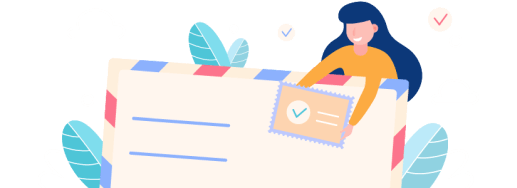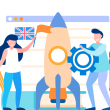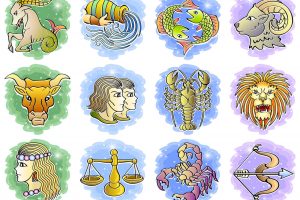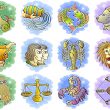Во второй понедельник октября Соединенные Штаты Америки отмечают День Колумба (Columbus Day). Отношение к этому празднику сложилось неоднозначное: будучи символом распространения западной цивилизации, для коренного населения Колумб стал скорее предвестником разрушения их мира. Именно по этой причине в День Колумба по улицам США проходят не только праздничные парады, но и демонстрации, участники которых скандируют лозунги о том, что Колумб был убийцей. Три американских штата, Гавайи, Аляска и Южная Дакота, вообще не признают этого праздника. В Южной Дакоте второй понедельник октября – День Коренных Американцев (Native American Day).
Как бы там ни было, Колумб стал легендарной личностью. Отправляясь на поиски кратчайшего пути в Индию, он открыл для западной цивилизации путь в Новый Свет и новые торговые пути, тем самым изменив политическую карту мира. Предлагаем вашему вниманию видеоматериал канала “History”, в котором вы найдете краткую информацию об истории Дня Колумба в Соединенных Штатах и о путешествии в Индию, закончившимся открытием новых земель.
Italians have long celebrated Christopher Columbus in tribute to their shared heritage. In 1937 President Roosevelt proclaimed October, 12 as Columbus Day. And in 1971 President Nixon declared Columbus Day a national holiday to be observed on a second Monday of October. [Thank you]. And why? Because Columbus discovered America and proved that the Earth was round except that’s not quite really happened which is into saving or have planning the thankings. Let’s take a look at Christopher Columbus, the man behind the myth, behind the holiday.
We all know how it started. On August 3rd 1492 Columbus and his three ships, the Niña, the Pinta and the Santa Maria, set out from Spain and embarked on a historic journey. True, but let’s settle the “why” once in for all. Columbus wasn’t trying to prove the Earth was round, he didn’t need to. Greek mathematician Pythagoras suspected we were living on a sphere as early as the 6th century B.C. and Aristotle backed him up two centuries later when he notices the Earth’s shadow could be seen during a lunary eclipse sliding past the Moon in miniature and it was round. So why did Columbus bothered getting off the couch at all? Money. In the 15th century spices were hot commodity. Traders shipping them between Asia and Europe could get rich quick. However with the fall of Constantinople to the Turks, Europe lost its most popular route to the treasures of the East. Columbus realised his opportunity become the first person to plot a western route to Asia and enjoy unprecedented glory and riches. Inconsistent maps made calculating routes difficult. Columbus finally charted the south-western course he believed was short enough to keep him and his men from dying of starvation and thirst. Spain’s queen Isabella eager to expand her empire agreed to roll the dice on Columbus’s route. So on that August morning in 1492 Columbus and his men sailed off in those famous ships laden with hopes of finding their way to Asia and making both Spain and themselves a heck a lot of money. After a pit stop in the Canary Islands the charted world was behind them. Columbus had been right not to trust existing maps, but he didn’t realised that his own plotted course to Asia was short by nearly 10 000 miles. Luckily, a seria of islands (the future West Indias) lay almost exactly where he believed India to be. And the relieved sailors made land fall. This is where things get tricky. We’re still not sure of the exact location where Columbus first landed, but he was convinced he’d made it to India and declared the route successfull. Mission accomplished. The Indians who greeted him were actually an indigenous people who had lived there for centuries. So the claim that Columbus discovered the Americas is only true from a European perspective. But as far as Columbus was concerned he was right where he’d expected to be – in an exotic land full of natives and spices. Columbus returned to the Spanish court a hero. All were convinced the route was a success and it surely was, but not as they had expected. Columbus inadvertently achieved the monumental task of joining the two hemispheres. In effect doubling the size of a habitable planet and establishing trade between the continents. So on Columbus Day raise a glass to fail of a navigator Christopher Columbus who missed the mark and did it just the thing.
Useful words and phrases:
- Tribute, n – дань.
Со словом holiday в данном материале было использовано три глагола: to proclaim, to declare, to observe.
- Proclaim, v — провозглашать, объявлять.
- Declare, v – заявлять, объявлять.
- Observe, v – праздновать, отмечать.
- Set out (from), v – начинать путешествие.
- Embark on, v – начинать, браться за.
- Settle, v – положить конец (разногласиям).
- Back up, v – поддерживать (напр. мнение).
- For all – несмотря на, что бы ни.
- Lunary eclipse – лунное затмение.
- Hot commodity – товар повышенного спроса (товар, пользующийся большим спросом).
- Inconsistent, adj – несогласованный, противоречивый.
- Chart (a course), v – наносить на карту (маршрут).
- Die of (starvation, thirst), v – умирать от (голода, жажды).
- Plat the route, v – планировать, прикидывать, вести расчёты; набрасывать схему, план; составлять (карту, смету и т. п.).
- Roll the dice, v – кидать кости.
- Be laden with – быть полными (грусти, надежд).
- Pit stop, n – остановка, привал.
- Mission accomplished – миссия завершена.
- Indigenous, adj – аборигенный, местный, туземный.
- Inadvertently, adv – случайно, ненамеренно, непреднамеренно, неумышленно, нечаянно (о действиях и поступках).
- Habitable, adj – обитаемая.
- Raise a glass to, v – выпить за…
- Miss the mark, v – бить мимо цели, не достичь (своей) цели, не добиться своего, потерпеть неудачу; ≈ делать невпопад.
- Just the thing – как раз то, что надо.
А теперь предлагаем вам выполнить короткий тест на эрудицию и понимание данного сюжета.
Если вы нашли ошибку, пожалуйста, выделите фрагмент текста и нажмите Ctrl+Enter.










